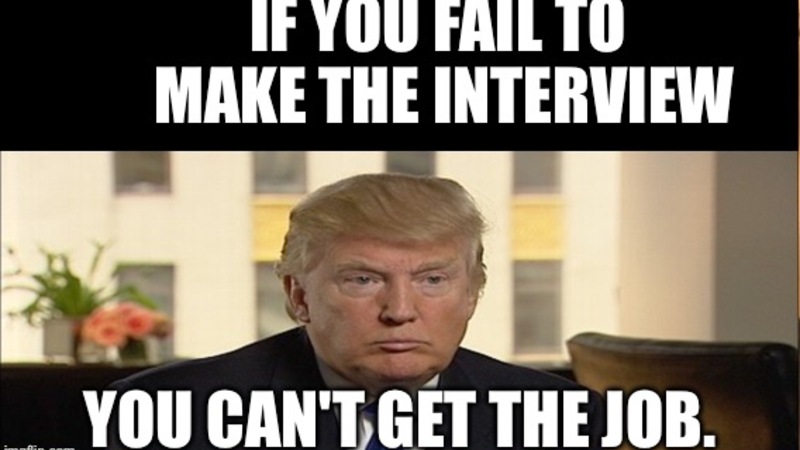No-one likes awkward moments; least of all in an interview
The issue arises when you worry so much about making sure every little thing goes right, that you forget about the things that could go wrong. It’s easily done so, how can you ensure that you have an interview experience free from embarrassment?
We have listed below 12 things all interviewees hope they don’t do on the big day, and how to avoid them:
12 things not to do at an interview
1) Turn up late!
Let’s face it, turning up late to an interview is never an option. It only leaves you looking unprofessional, unorganised and/or sweaty.
Plan your route in advance, and always add an extra half an hour onto your expected journey time, just in case. After all, public transport has an extensive history of failing us and there are guaranteed to be roadworks so plan ahead.
2) Have your phone on loud
You know how embarrassing it in when your phone goes off in the cinema? Yeah, this is worse.
For your own interview safety, always remember to turn everything off before you go in. At the very least, leave it on silent. Especially if you have a questionable ringtone that could potentially cause offence or embarrassment.
Oh, and please don’t attempt to check your messages or missed calls on-the-fly either. Recruiters are understanding, but they’re not idiots!
3) Use excessive slang
The formality of your speech is partly dependent on the role you’re going for and the type of company they are. But as a general rule, avoid using slang. Remember, although you should feel comfortable around your interviewers, they’re not your best friends just yet. Mate’s, bro’s and baes are never appropriate.
4) Be arrogant and over-confident
Being confident in your abilities and expressing why you’re the right fit for a role is fine, but don’t overdo it. There’s a fine line between wanting the job and seeming entitled to it.
It’s okay to talk about your previous achievements, and ask about potential promotions within the role, but it’s not okay to tell the interviewer that you want their job.
Because nobody likes a show-off… (Or a cliché)
5) Dress inappropriately
Interview outfit etiquette isn’t exactly set in stone, but there is one simple rule to remember: it’s always better to be overdressed than underdressed.
Try your outfit on the day before, make sure everything fits appropriately, should you be wearing them - sort out any accessories night before. After all, the last thing you want to do is spend hours before an interview trying to find your other black sock or a pair of tights without a rip in them.
Interview outfit tip: without exception tracksuit bottoms are never acceptable.
6) Moan about your current employer
OK, so your favourite mug went missing and you’re heartbroken.
We get it. However, even if you’re 100% sure it was most likely Dave from IT who took it, an interview probably is not the best time to start voicing all of those frustrations
Avoid the temptation to express how much you dislike your current boss or complain about your colleagues and be as positive as possible. Sound like a team player, not someone who holds a grudge.
7) Lie
We all know that most people tell a little white lie and over-exaggerate at interview right?
This might be true, but it is a risky business, and it rarely works out for the best. You will only end up stumbling over yourself when asked to elaborate your story, and there will be tell-tale signs from your body language that could easily give it all away.
So be honest about your genuine achievements and experience and it will work in your favour. And if not? Get ready for the most awkward first day ever when you eventually get the job and you have to reveal that you can’t actually speak Spanish!
8) Slouch/yawn/fall asleep…
Or anything else that implies boredom. You will not be taken seriously if you’re constantly yawning, sitting so low in your chair that you’re practically on the floor, or generally looking like you’d rather be in bed.
Be aware of your body language and stay focussed throughout, listening politely to what the interviewer has to say and remaining positive and enthusiastic. Oh, and conscious. That helps.
9) Forget to listen
It’s important to wait your turn to speak, and not interrupt your interviewer’s mid-speech. It might seem like a good idea to express your enthusiasm by constantly chatting, but only do this when the ball’s in your court.
Sit patiently and listen to what they have to say. The last thing you want is to go on to ask a question they’ve already answered or have absolutely no understanding of the role because you were too busy daydreaming about what you’re going to have for dinner that evening.
10) Focus on the Money
You want the job because you need to earn money, that’s a given. It’s a fact of life. However, you should also want it for other reasons like, let’s just say, you’d actually be good at and/or enjoy it. These are what will impress the interviewer and make them more likely to consider you for the position.
Individual financial issues aren’t an interview friendly topic either, so keep it professional. Only mention the M word if your prospective employer asks about salary expectations – and even then, be sensible with what you ask for.
11) Apologise too much
Don’t apologise for a lack of experience or an inability to answer a question straight away, especially if you’re saying ‘sorry’ repeatedly. This will indicate a lack of confidence and suggest you’re unsure of your capabilities.
There are some things, however, that do need an apology. i.e. accidently calling your interviewer Mum definitely falls firmly within this category.
12) Fail to make eye contact
Wide-eyed enthusiasm is fine. Wide-eyed staring, not so much.
If you do manage to settle on a non-threatening amount of eye contact, embrace it. It can be a great way to show respect on both sides and lets the interviewer knows you’re listening to them and are confident in what you have to say.

